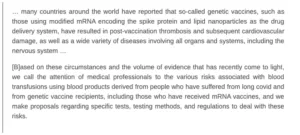(The Exposé) Japanese researchers warn of the risks of using blood from mRNA covid vaccine recipients, highlighting potential deadly effects and the need for urgent action to secure the global blood supply.
Blood contaminated with prion-like structures from the spike protein raises the risk of inducing fatal neurodegenerative diseases in recipients. The potential transmission of harmful proteins through exosomes (aka “shedding”) and the risk of autoimmune diseases due to the vaccines’ mechanism and components like lipid nanoparticles (“LNPs”) are other major concerns.
Proposals for managing blood collection include rigorous donor interviews, deferral periods, and a suite of tests to ensure the safety of blood products.
The researchers advocate for comprehensive testing of both injected and non-injected people to assess the safety of blood products and suggest discarding blood products contaminated with spike proteins or modified mRNA until effective removal methods have been developed.
They call for suspending all gene-based “vaccines” and conducting a rigorous harm-benefit assessment in light of the serious health injuries reported. They also urge countries and organisations to take concrete steps to address and mitigate the already identified risks.
We’ve previously published an article highlighting this study but the following is Dr. Joseph Mercola’s more in-depth analysis.
Researchers Call for Urgent Action to Address Mass Contamination of Blood Supply
In a recent meta-analysis1,2 posted on preprints.org, Japanese researchers warn of potentially deadly risks to patients who receive blood from people who have taken mRNA covid injections and call for urgent action to ensure the safety of the global blood supply. According to the authors:3
Blood From Injected Donors May Pose Risk to Neurological Health
One particular risk addressed in this paper is the implications of blood tainted with prion-like structures found within the spike protein. Prions are misfolded proteins that can cause neurodegenerative diseases, such as Creutzfeldt-Jakob Disease (“CJD”) in humans, by inducing the misfolding of normal proteins in the brain.
Prion diseases are characterised by a long incubation period, followed by rapid progression and high mortality. The suggestion that the spike protein of SARS-CoV-2, especially from certain variants, might contain prion-like domains raises concerns for several reasons:
- Transmission risk – If spike proteins with prion-like structures can be transmitted through blood transfusions, there might be a risk of inducing prion diseases in recipients. Prion diseases are notoriously difficult to diagnose early, have no cure and are fatal, making any potential transmission through blood products a significant safety concern.
- Detection and removal challenges – Current blood screening processes do not specifically test for prions, partly because prion diseases are rare and partly due to the technical challenges in detecting prions at low concentrations. If spike proteins with prion-like properties are present in the blood of covid injected people, existing blood safety protocols may not be adequate to prevent transmission.
- Long-term safety concerns – Prion diseases have long latency periods, meaning that symptoms can appear years or even decades after exposure. This delay complicates efforts to trace the source of an infection back to a blood transfusion and assess the safety of blood supplies over time.
- Impacts on blood supply management – Concerns about the potential risks associated with prion-like structures in spike proteins might lead to changes in donor eligibility criteria or the implementation of additional screening measures. These changes could impact the availability of blood products, which are critical for routine medical procedures.
- Public confidence – Public awareness of these potential risks, even if they are theoretical or have a very low likelihood of occurring, could affect people’s willingness to donate or receive blood transfusions, thereby lowering blood donation rates and the overall trust in the safety of blood transfusions.
The authors stress the need for comprehensive studies to better understand the implications of these prion-like structures in the spike protein, not only for mRNA jab safety but also for the broader implications for public health measures like blood transfusion practices.
Other Potential Health Hazards of Contaminated Blood
Contaminated blood may also pose other serious health risks, including:







